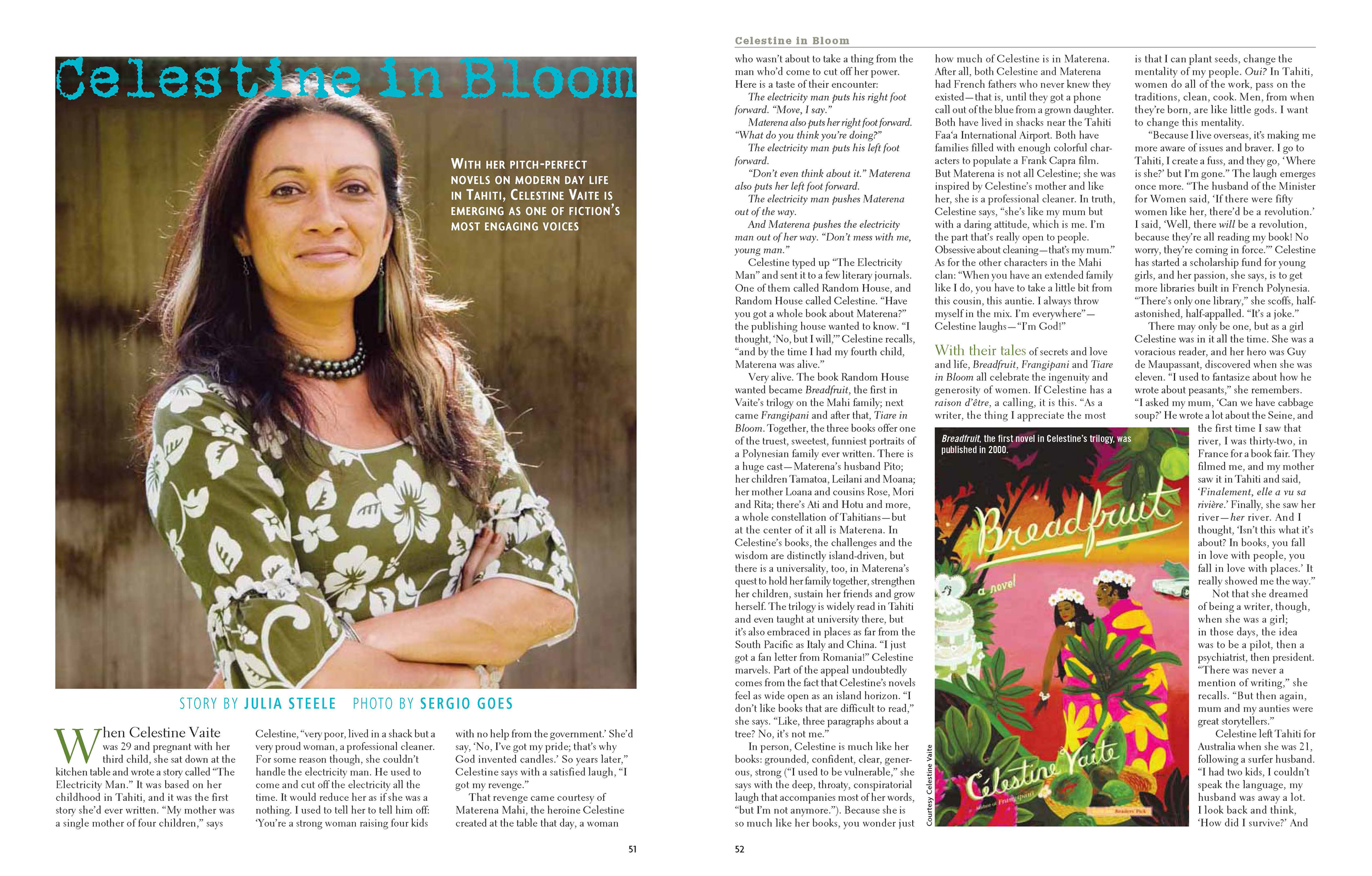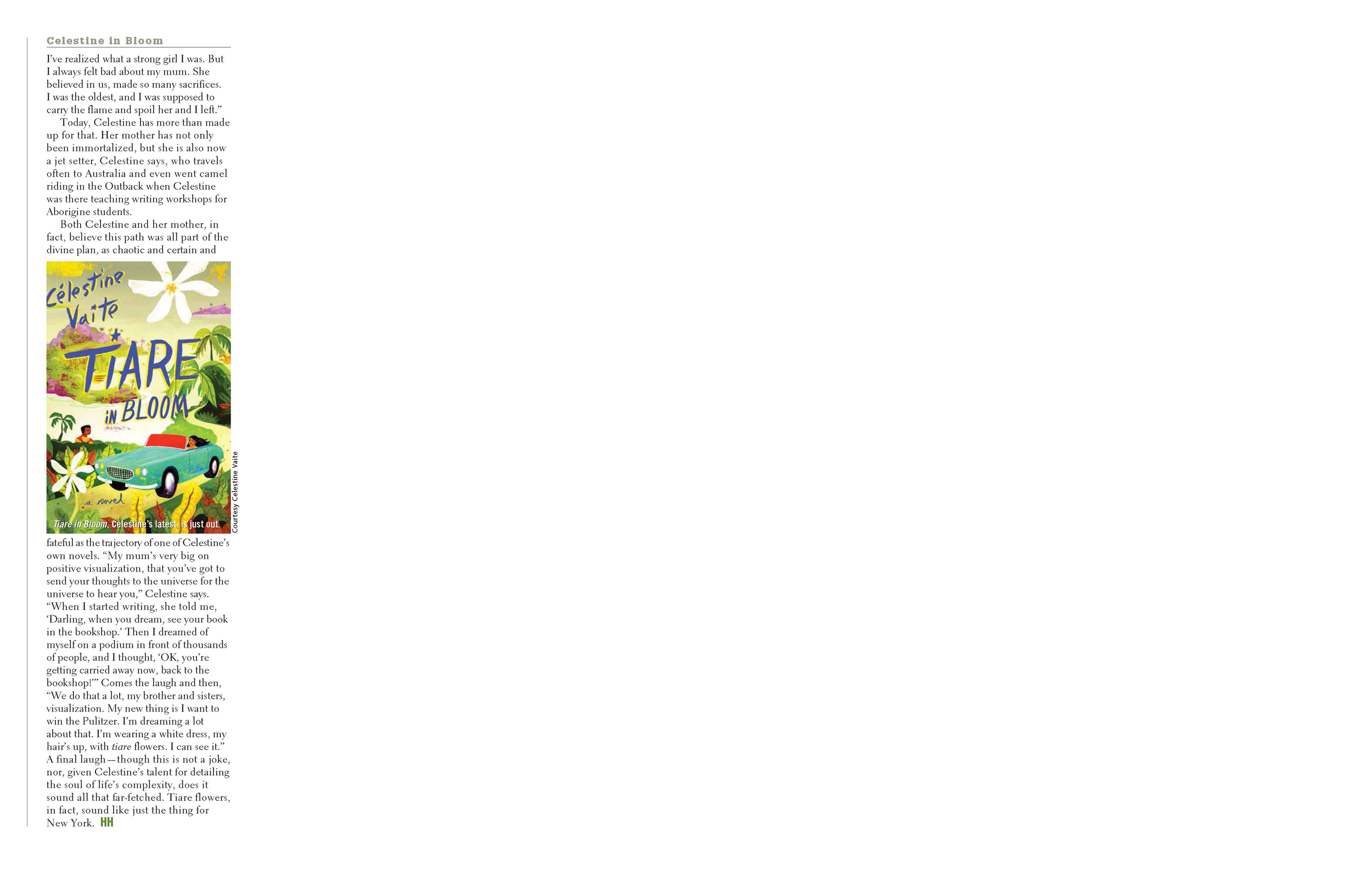When Celestine Vaite was 29 and pregnant with her third child, she sat down at the kitchen table and wrote a story called “The Electricity Man.” It was based on her childhood in Tahiti, and it was the first story she’d ever written. “My mother was a single mother of four children,” says Celestine, “very poor, lived in a shack but a very proud woman, a professional cleaner. For some reason though, she couldn’t handle the electricity man. He used to come and cut off the electricity all the time. It would reduce her as if she was a nothing. I used to tell her to tell him off: ‘You’re a strong woman raising four kids with no help from the government.’ She’d say, ‘No, I’ve got my pride; that’s why God invented candles.’ So years later,” Celestine says with a satisfied laugh, “I got my revenge.”
That revenge came courtesy of Materena Mahi, the heroine Celestine created at the table that day, a woman who wasn’t about to take a thing from the man who’d come to cut off her power. Here is a taste of their encounter:
The electricity man puts his right foot forward. “Move, I say.”
Materena also puts her right foot forward. “What do you think you’re doing?”
The electricity man puts his left foot forward.
“Don’t even think about it.” Materena also puts her left foot forward.
The electricity man pushes Materena out of the way.
And Materena pushes the electricity man out of her way. “Don’t mess with me, young man.”
Celestine typed up “The Electricity Man” and sent it to a few literary journals. One of them called Random House, and Random House called Celestine. “Have you got a whole book about Materena?” the publishing house wanted to know. “I thought, ‘No, but I will,’” Celestine recalls, “and by the time I had my fourth child, Materena was alive.”
Very alive. The book Random House wanted became Breadfruit, the first in Vaite’s trilogy on the Mahi family; next came Frangipani and after that, Tiare in Bloom. Together, the three books offer one of the truest, sweetest, funniest portraits of a Polynesian family ever written. There is a huge cast—Materena’s husband Pito; her children Tamatoa, Leilani and Moana; her mother Loana and cousins Rose, Mori and Rita; there’s Ati and Hotu and more, a whole constellation of Tahitians—but at the center of it all is Materena. In Celestine’s books, the challenges and the wisdom are distinctly island-driven, but there is a universality, too, in Materena’s quest to hold her family together, strengthen her children, sustain her friends and grow herself. The trilogy is widely read in Tahiti and even taught at university there, but it’s also embraced in places as far from the South Pacific as Italy and China. “I just got a fan letter from Romania!” Celestine marvels. Part of the appeal undoubtedly comes from the fact that Celestine’s novels feel as wide open as an island horizon. “I don’t like books that are difficult to read,” she says. “Like, three paragraphs about a tree? No, it’s not me.”
In person, Celestine is much like her books: grounded, confident, clear, generous, strong (“I used to be vulnerable,” she says with the deep, throaty, conspiratorial laugh that accompanies most of her words, “but I’m not anymore.”). Because she is so much like her books, you wonder just how much of Celestine is in Materena. After all, both Celestine and Materena had French fathers who never knew they existed—that is, until they got a phone call out of the blue from a grown daughter. Both have lived in shacks near the Tahiti Faa‘a International Airport. Both have families filled with enough colorful characters to populate a Frank Capra film. But Materena is not all Celestine; she was inspired by Celestine’s mother and like her, she is a professional cleaner. In truth, Celestine says, “she’s like my mum but with a daring attitude, which is me. I’m the part that’s really open to people. Obsessive about cleaning—that’s my mum.” As for the other characters in the Mahi clan: “When you have an extended family like I do, you have to take a little bit from this cousin, this auntie. I always throw myself in the mix. I’m everywhere”—Celestine laughs—“I’m God!”
With their tales of secrets and love and life, Breadfruit, Frangipani and Tiare in Bloom all celebrate the ingenuity and generosity of women. If Celestine has a raison d’être, a calling, it is this. “As a writer, the thing I appreciate the most is that I can plant seeds, change the mentality of my people. Oui? In Tahiti, women do all of the work, pass on the traditions, clean, cook. Men, from when they’re born, are like little gods. I want to change this mentality.
“Because I live overseas, it’s making me more aware of issues and braver. I go to Tahiti, I create a fuss, and they go, ‘Where is she?’ but I’m gone.” The laugh emerges once more. “The husband of the Minister for Women said, ‘If there were fifty women like her, there’d be a revolution.’ I said, ‘Well, there will be a revolution, because they’re all reading my book! No worry, they’re coming in force.’” Celestine has started a scholarship fund for young girls, and her passion, she says, is to get more libraries built in French Polynesia. “There’s only one library,” she scoffs, half-astonished, half-appalled. “It’s a joke.”
There may only be one, but as a girl Celestine was in it all the time. She was a voracious reader, and her hero was Guy de Maupassant, discovered when she was 11. “I used to fantasize about the way he wrote about peasants,” she remembers. “I asked my mum, ‘Can we have cabbage soup?’ He wrote a lot about the Seine, and the first time I saw that river, I was 32, in France for a book fair. They filmed me, and my mother saw it back in Tahiti, and she said, ‘Finalement, elle a vu sa rivière.’ Finally, she saw her river—her river. And I thought, ‘Isn’t this what it’s about? In books, you fall in love with people, you fall in love with places.’ It really showed me the way.”
Not that she dreamed of being a writer, though, when she was a girl; in those days, the idea was to be a pilot, then a psychiatrist, then president. “There was never a mention of writing,” she recalls. “But then again, mum and my aunties were great storytellers.”
Celestine left Tahiti for Australia when she was 21, following a surfer husband. “I had two kids, I couldn’t speak the language, my husband was away a lot. I look back and think, ‘How did I survive?’ And I’ve realized what a strong girl I was. But I always felt bad about my mum. She believed in us, made so many sacrifices. I was the oldest, and I was supposed to carry the flame and spoil her and I left.”
Today, Celestine has more than made up for that. Her mother has not only been immortalized, but she is also now a jet setter, Celestine says, who travels often to Australia and even went camel riding in the Outback when Celestine was there teaching writing workshops for Aborigine students.
Both Celestine and her mother, in fact, believe this path was all part of the divine plan, as chaotic and certain and fateful as the trajectory of one of Celestine’s own novels. “My mum’s very big on positive visualization, that you’ve got to send your thoughts to the universe for the universe to hear you,” Celestine says. “When I started writing, she told me, ‘Darling, when you dream, see your book in the bookshop.’ Then I dreamed of myself on a podium in front of thousands of people, and I thought, ‘OK, you’re getting carried away now, back to the bookshop!’” Comes the laugh and then, “We do that a lot, my brother and sisters, visualization. My new thing is I want to win the Pulitzer. I’m dreaming a lot about that. I’m wearing a white dress, my hair’s up, with tiare flowers. I can see it.” A final laugh—though this is not a joke, nor, given Celestine’s talent for detailing the soul of life’s complexity, does it sound all that far-fetched. Tiare flowers, in fact, sound like just the thing for New York.

